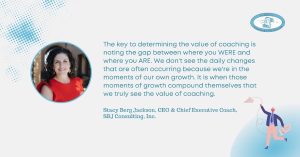
From a focus on individual-level KPIs to using goal orientation, here are nine answers to the questions, “For those who have had a coach, how do you determine the value of the coaching, and can you give your best insights to help others determine the value of coaching for them?”
· Focus On Individual-level KPIs, Not Collective Outcomes
· See an Increase in Self-confidence
· Look at the End Goal You Are Trying to Achieve
· Examine How Your Perceptions Have Changed
· Ask Yourself, “Am I Where I Was?”
· Has the Coach Worn Your Shoes?
· Do You Feel More Motivated or Inspired?
· Quantify the Skills of the Coach and Your Time
· Adopt a Goal-Oriented Outlook
Focus on Individual-level KPIs, Not Collective Outcomes
In business coaching, there is a major issue with determining the value of that coaching based on the success of your company. Using ROI and other quantifiable, organizational-level metrics to measure the success of your coach is unfair.
Those metrics represent collective inputs, of which the coach touches very little. Why should a business coach be held accountable for the success of the organization if he or she only coaches one executive?
That is why I think a much better determinant of value is individual-level, qualitative measures. Did you, as the CEO, achieve your KPIs? Did you accomplish the goals you set out for yourself that quarter or year?
I determined the value of my coach’s worth based on my individual accomplishments quarterly (generally qualitative KPIs) and not on the outcomes of my company as a whole.
- John Ross, CEO, Test Prep Insight
See an Increase in Self-Confidence
As a manager who has worked with a coach, I can say with conviction that it has increased my self-confidence significantly. My coach has helped me deal with employee concerns better and assert confidence in challenging situations.
I believe that self-confidence is an asset for anyone pursuing a leadership role. When it comes to empowerment, I have been able to help my employees achieve their work goals the same way my coach helped me achieve mine. Professional coaching has been valuable in helping me reorient my goals toward my personal success. This has then translated into my company’s success.
Some techniques my coach has introduced to me, like collaboration, have been immensely valuable. I have gained a positive outlook on work, which shows in how I carry out my managerial duties. To anyone looking to improve their performance, I strongly recommend they seek the professional services of a coach.
- Jay Bats, Co-Founder, ContentBASE
Look at the End Goal You Are Trying to Achieve
When determining the value of coaching, it’s important to look at the end goal you are trying to achieve. What is your desired outcome and how will a coach help you get there?
Once you have identified this outcome, you can start exploring what type of coaching would be best for helping you reach that goal. Think about the specific skills or knowledge that you need to develop in order to reach your goal and look for a coach who specializes in those areas.
It’s also important to consider the cost of coaching versus the value it will bring. Coaching can be expensive, so it pays to do your research into different coaches and their fees.
Remember, the value of coaching isn’t only measured by the money it costs. It’s also important to consider the potential benefits and changes you could experience because of working with a coach. This could include more confidence, improved performance, or simply more clarity on how to move forward.
- Amira Irfan, Founder & CEO, A Self Guru
Examine How Your Perceptions Have Changed
I determine the value of coaching by how much I learn in the process. A good coach will leave you with insight for you to think about and apply to your life. Coaching is more than getting you to change bad habits and create good habits. It gets you to re-evaluate your motives and address them, re-evaluate your viewpoints, and, in some cases, change your perceptions.
If you are doing that throughout the process, you have valuable coaching.
Ask Yourself, “Am I Where I Was?”
Coaching, a little like weight loss, can sometimes feel like a road to nowhere until one day you receive comments that sound like “Wow, you look amazing!” or in this instance, “You really handled that situation well.” or “Your team responds so well to your direction.”
The key to determining the value of coaching is noting the gap between where you WERE and where you ARE. We don’t see the daily changes that are often occurring because we’re in the moments of our own growth. It is when those moments of growth compound themselves that we truly see the value of coaching.
- Stacy Berg Jackson, CEO & Chief Executive Coach, SBJ Consulting, Inc.

Has the Mentor Worn Your Shoes?
There is an increasing proliferation of fake gurus posing as transformative coaches today. Therefore, I keenly scrutinize the value a coach offers me. For me, the coach’s value depends on how well he has first-hand experience of my situation or industry.
Each industry has its peculiarities, and generic coaching flops easily as the insights the mentor shares are not culturally contoured to the unique configurations of your industry.
Therefore, I only go with mentors who have been there and done that in my very industry. So, I prefer senior colleagues as mentors.
When they advise you, their insights are less speculative and hypothetical, coming from a place of personal experience. They have been in those same trenches as you are now and have faced the shelling.
Such mentors give you actionable tips, not some general-purpose motivational high that fades the next day you get back to work.
- Lotus Felix, CEO

Do You Feel More Motivated or Inspired?
I have found that the value of coaching can be difficult to determine. In some cases, it may be obvious that coaching is worth the investment. For example, if you are working with a coach to improve your tennis game, it is likely that you will see a direct improvement in your performance.
However, there are other times when the value of coaching is less clear. For example, if you are working with a life coach to help you find your purpose, the results may be more difficult to quantify.
In these cases, I have found it helpful to ask myself a few questions: Does coaching make me feel motivated and inspired? Do I feel like I am making progress toward my goals? Do I feel like I am learning new things about myself? If the answer to these questions is “yes”, then I would say that coaching is definitely worth the investment.
- Derek Bruce, Senior Director, Skills Training Group
Quantify the Skills of the Coach and Your Time
There are a few things you can keep in mind when determining the value of a coach. First, consider the experience of the coach. How many years have they been coaching? What is their success rate? Are they familiar with your specific needs?
Second, think about the coach’s training and qualifications. Do they have any special certifications? What kind of education do they have?
Third, ask yourself how well the coach communicates and how well they connect. Do they provide clear and concise observations? Do they encourage and motivate their clients?
Lastly, consider the price of the coach’s services. Is it affordable for you? Is it worth the investment? Keeping these factors in mind will help you determine the value of the coach.
- Benjamin Okyere, Founder & CTO, Stress Reliever
Adopt a Goal-Oriented Outlook
Coaching brings many benefits. However, it’s difficult to define them tangibly. You may feel that your performance has improved, your confidence has increased, or your productivity is higher. But where’s the evidence?
That’s why it’s really helpful to set specific goals. Work with your coach to create realistic, relevant targets. Then, decide the actionable steps you will take toward them.
This is a useful way to measure your progress and see how coaching is supporting it. Being able to tick each step off provides a sense of satisfaction, which will help to keep you motivated. This technique also helps you to stay on track and avoid getting distracted by matters which won’t contribute to your overall aims.
Being able to evaluate the effectiveness of coaching in terms of how you have accomplished your goals is a great way to truly understand the positive impacts it can have on your career. It’s a substantial reminder of what you’re capable of, given the right support.
- Alex Mastin, CEO & Founder, Home Grounds




